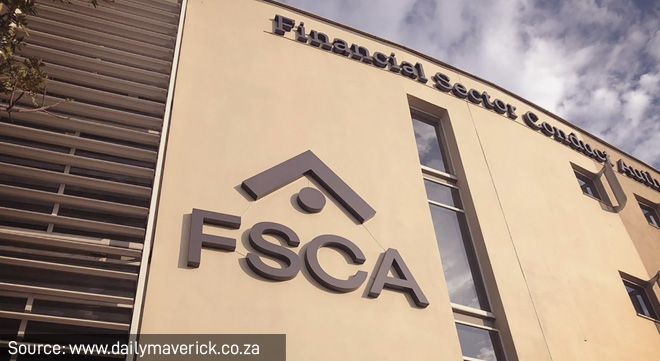The FSCA has imposed a fine of R1 million on Lehumo Securities (Pty) Ltd and its director, Maudi Martin Lentsoane, and debarred him for 12 years.
In March, the Authority provisionally suspended Lehumo Securities’ licence based on the findings of its investigation into Regenesis Markets (Pty) Ltd, which subsequently traded as Lehumo Securities.
Regenesis Markets, an authorised FSP, provided online trading products, including contracts for difference (CFDs), single stock futures, indices, local and international cash, commodities, and exchange-traded funds.
The FSCA informed the public in June 2022 that it had initiated the investigation after receiving complaints from clients that Lehumo had not honoured their requests to withdraw funds.
The Authority issued notices in March this year informing the investigated parties of its findings and the sanctions it intended to impose, and invited Lentsoane and Lehumo to respond by 19 April.
According to the notices, the FSCA intended to debar Lentsoane for 15 years, impose an administrative penalty of R1 373 632 on Regenesis Markets (Lehumo Securities) and Lentsoane, and withdraw Regenesis Markets’ FSP licence.
The enforcement notices (dated 30 October) issued to Regenesis (Lehumo) and Lentsoane show that the Authority reduced the period of debarment to 12 years and the fine to R1m.
Gerhard van Deventer, the FSCA’s head of enforcement, told Moonstone the lesser penalties were a result of the mitigating factors. These included that Lentsoane reimbursed clients and his compliance with the Authority’s directive in May 2022 for Regenesis to cease accepting new clients and prevent existing clients from transacting.
The FSCA’s website shows that Lehumo Securities’ licence was withdrawn on 1 November.
Most client funds were not invested
According to the findings of the FSCA’s investigation, Regenesis collected about R19 664 430 from clients from 1 October 2020 to 12 May 2022. However, it invested only R1 457 328, or 7.4% of the total funds it collected, and used the balance to pay returns to clients.
It was the Authority’s opinion that “Lentsoane attempted, or conspired with, aided, abetted, induced, incited, or procured Regenesis Markets to operate a Ponzi scheme”.
Regenesis incurred trading losses in respect of the R1 457 328 it invested with Match Prime Liquidity, which was the liquidity provider principal and issuer of the CFDs.
The FSCA said Lentsoane exercised his own discretion and made investment decisions on behalf of clients. Regenesis Markets and Lentsoane therefore acted as investment managers (discretionary FSP), for which they required a Category II licence, but neither of them was licensed as such.
In this respect, the Authority concluded that Lentsoane caused Regenesis to breach section 7(1)(a) of the Financial Advisory and Intermediary Services Act.
“When clients submitted withdrawal requests, Lentsoane admitted that he was dishonest and not upfront with his clients,” the report states. He blamed the delays on Match Prime, whereas the FSCA found this not to be the case.
According to the Authority, Lentsoane misled its investigators into believing he had a “hedge account” with Match Prime, which, he claimed, was supposed to open individual accounts on behalf of clients.
“He blamed Match Prime for consolidating or pooling the funds into one account. He claimed that he only discovered at a later stage that Match Prime did not have individual accounts for each client.”
But the FSCA said Match Prime informed the investigators that Regenesis held one trading account in its own name, and Lentsoane was the authorised trader in respect of the account.
The Authority concluded that Lentsoane breached section 139(5) of the Financial Sector Regulation Act when he knowingly provided the investigators with false and/or misleading information.
It said Lentsoane made excuses and was not transparent with clients who complained and asked for their money back. “He only refunded them from his own pocket after they complained to the Authority.”
The report said Lentsoane ignored recommendations by Regenesis’ external compliance officer. He also concealed important information from the compliance officer regarding Regenesis’ business operations. Therefore, she was not aware of the issues that led to the complaints.
Statutory non-compliance
The FSCA’s said Lentsoane – as a 100% shareholder, director, and key individual – was required to ensure that Regenesis complied with all its statutory obligations.
Nevertheless, the Authority said Lentsoane failed to comply the following provisions (in addition to the contraventions mentioned above):
- Section 8(8) read with section 42(1) of the Determination of Fit and Proper Requirements, which require a KI to ensure the FSP has the operational ability to fulfil its statutory responsibilities.
- Section 8A of the FAIS Act read with section 8(1) of the Fit and Proper Requirements, which require an authorised FSP, KI, and representative to continue to comply with the Fit and Proper Requirements.
- Section 2 of the General Code of Conduct for Authorised FSPs and Representatives, which requires a provider to “exercise due care, skill and diligence and act in the interest of clients and the integrity of the financial services industry”.
- Section 2(a) of the Financial Institutions (Protection of Funds) Act, which requires a financial institution or its director to observe the utmost good faith and exercise proper care and diligence when investing, holding, or administering funds.



